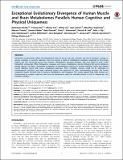Files in this item
Exceptional evolutionary divergence of human muscle and brain metabolomes parallels human cognitive and physical uniqueness
Item metadata
| dc.contributor.author | Bozek, Katarzyna | |
| dc.contributor.author | Wei, Yuning | |
| dc.contributor.author | Yan, Zheng | |
| dc.contributor.author | Liu, Xiling | |
| dc.contributor.author | Xiong, Jieyi | |
| dc.contributor.author | Sugimoto, Masahiro | |
| dc.contributor.author | Tomita, Masaru | |
| dc.contributor.author | Paeaebo, Svante | |
| dc.contributor.author | Pieszek, Raik | |
| dc.contributor.author | Sherwood, Chet C. | |
| dc.contributor.author | Hof, Patrick R. | |
| dc.contributor.author | Ely, John J. | |
| dc.contributor.author | Steinhauser, Dirk | |
| dc.contributor.author | Willmitzer, Lothar | |
| dc.contributor.author | Bangsbo, Jens | |
| dc.contributor.author | Hansson, Ola | |
| dc.contributor.author | Call, Josep | |
| dc.contributor.author | Giavalisco, Patrick | |
| dc.contributor.author | Khaitovich, Philipp | |
| dc.date.accessioned | 2016-05-31T11:30:04Z | |
| dc.date.available | 2016-05-31T11:30:04Z | |
| dc.date.issued | 2014-05-27 | |
| dc.identifier | 141912469 | |
| dc.identifier | 1f213dd8-5620-43e0-bfca-2d3b32cb58d0 | |
| dc.identifier | 000336969200021 | |
| dc.identifier | 84901435099 | |
| dc.identifier.citation | Bozek , K , Wei , Y , Yan , Z , Liu , X , Xiong , J , Sugimoto , M , Tomita , M , Paeaebo , S , Pieszek , R , Sherwood , C C , Hof , P R , Ely , J J , Steinhauser , D , Willmitzer , L , Bangsbo , J , Hansson , O , Call , J , Giavalisco , P & Khaitovich , P 2014 , ' Exceptional evolutionary divergence of human muscle and brain metabolomes parallels human cognitive and physical uniqueness ' , PLoS Biology , vol. 12 , no. 5 , e1001871 . https://doi.org/10.1371/journal.pbio.1001871 | en |
| dc.identifier.issn | 1545-7885 | |
| dc.identifier.other | ORCID: /0000-0002-8597-8336/work/37477850 | |
| dc.identifier.uri | https://hdl.handle.net/10023/8902 | |
| dc.description.abstract | Metabolite concentrations reflect the physiological states of tissues and cells. However, the role of metabolic changes in species evolution is currently unknown. Here, we present a study of metabolome evolution conducted in three brain regions and two non-neural tissues from humans, chimpanzees, macaque monkeys, and mice based on over 10,000 hydrophilic compounds. While chimpanzee, macaque, and mouse metabolomes diverge following the genetic distances among species, we detect remarkable acceleration of metabolome evolution in human prefrontal cortex and skeletal muscle affecting neural and energy metabolism pathways. These metabolic changes could not be attributed to environmental conditions and were confirmed against the expression of their corresponding enzymes. We further conducted muscle strength tests in humans, chimpanzees, and macaques. The results suggest that, while humans are characterized by superior cognition, their muscular performance might be markedly inferior to that of chimpanzees and macaque monkeys. | |
| dc.format.extent | 14 | |
| dc.format.extent | 1395201 | |
| dc.language.iso | eng | |
| dc.relation.ispartof | PLoS Biology | en |
| dc.subject | Mass-spectrometry | en |
| dc.subject | Pan-troglodytes | en |
| dc.subject | Chimpanzee | en |
| dc.subject | Metabolites | en |
| dc.subject | Strength | en |
| dc.subject | Homo | en |
| dc.subject | QL Zoology | en |
| dc.subject | RC0321 Neuroscience. Biological psychiatry. Neuropsychiatry | en |
| dc.subject.lcc | QL | en |
| dc.subject.lcc | RC0321 | en |
| dc.title | Exceptional evolutionary divergence of human muscle and brain metabolomes parallels human cognitive and physical uniqueness | en |
| dc.type | Journal article | en |
| dc.contributor.institution | University of St Andrews. School of Psychology and Neuroscience | en |
| dc.contributor.institution | University of St Andrews. Centre for Social Learning & Cognitive Evolution | en |
| dc.identifier.doi | https://doi.org/10.1371/journal.pbio.1001871 | |
| dc.description.status | Peer reviewed | en |
| dc.identifier.url | http://journals.plos.org/plosbiology/article?id=10.1371/journal.pbio.1001871#s5 | en |
This item appears in the following Collection(s)
Items in the St Andrews Research Repository are protected by copyright, with all rights reserved, unless otherwise indicated.

